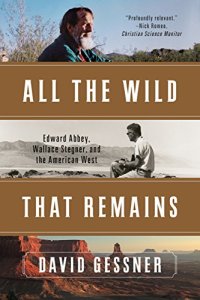
Ebook: All the wild that remains: Edward Abbey, Wallace Stegner, and the American West
Author: David Gessner
- Genre: Literature // Prose
- Tags: Authors, Arts & Literature, Biographies & Memoirs, United States, American Revolution, Civil War, US Presidents, Historical, Biographies & Memoirs, Environmentalists & Naturalists, Professionals & Academics, Biographies & Memoirs, State & Local, United States, Americas, History, Conservation, Energy, Nature & Ecology, Science & Math, Environmentalism, Environment, Science & Math, Authors, Arts & Literature, Biographies & Memoirs, Categories, Kindle Store, Environmentalists & Naturalists, Professionals & Academics, Biographie
- Year: 2015
- Publisher: W. W. Norton & Company
- Edition: 1
- Language: English
- epub
An homage to the West and to two great writers who set the standard for all who celebrate and defend it.
Archetypal wild man Edward Abbey and proper, dedicated Wallace Stegner left their footprints all over the western landscape. Now, award-winning nature writer David Gessner follows the ghosts of these two remarkable writer-environmentalists from Stegner's birthplace in Saskatchewan to the site of Abbey's pilgrimages to Arches National Park in Utah, braiding their stories and asking how they speak to the lives of all those who care about the West.
These two great westerners had very different ideas about what it meant to love the land and try to care for it, and they did so in distinctly different styles. Boozy, lustful, and irascible, Abbey was best known as the author of the novel The Monkey Wrench Gang (and also of the classic nature memoir Desert Solitaire), famous for spawning the idea of guerrilla actions—known to admirers as "monkeywrenching" and to law enforcement as domestic terrorism—to disrupt commercial exploitation of western lands. By contrast, Stegner, a buttoned-down, disciplined, faithful family man and devoted professor of creative writing, dedicated himself to working through the system to protect western sites such as Dinosaur National Monument in Colorado.
In a region beset by droughts and fires, by fracking and drilling, and by an ever-growing population that seems to be in the process of loving the West to death, Gessner asks: how might these two farseeing environmental thinkers have responded to the crisis?
Gessner takes us on an inspiring, entertaining journey as he renews his own commitment to cultivating a meaningful relationship with the wild, confronting American overconsumption, and fighting environmental injustice—all while reawakening the thrill of the words of his two great heroes.